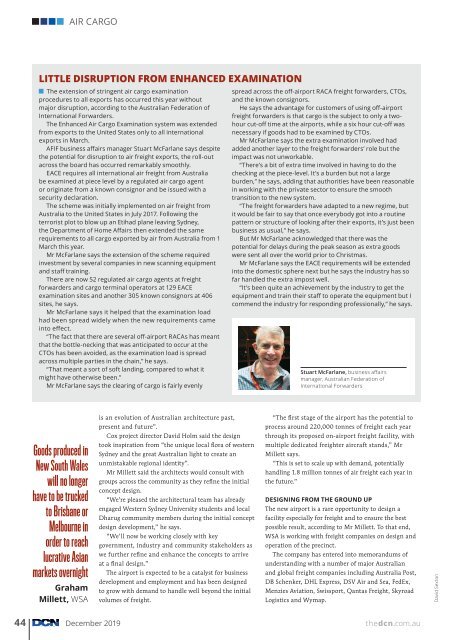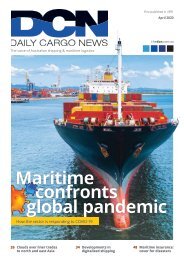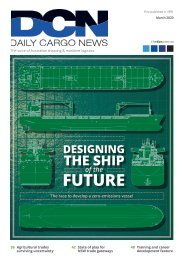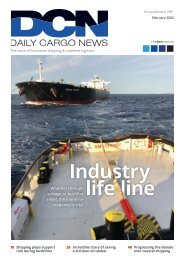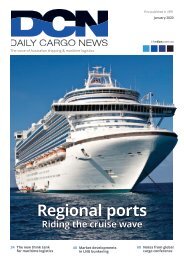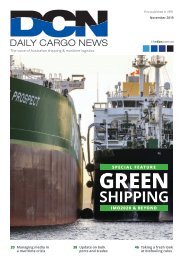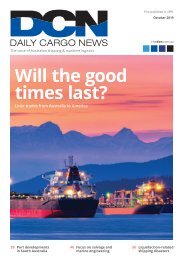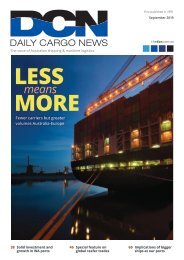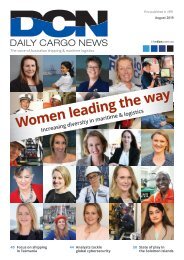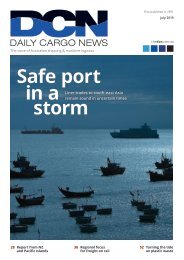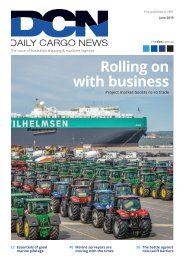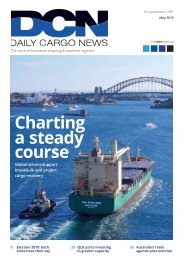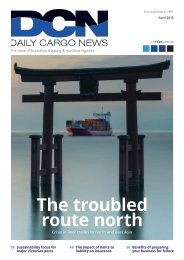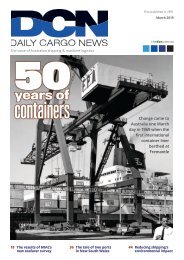DCN December Edition 2019
Create successful ePaper yourself
Turn your PDF publications into a flip-book with our unique Google optimized e-Paper software.
AIR CARGO<br />
LITTLE DISRUPTION FROM ENHANCED EXAMINATION<br />
The extension of stringent air cargo examination<br />
procedures to all exports has occurred this year without<br />
major disruption, according to the Australian Federation of<br />
International Forwarders.<br />
The Enhanced Air Cargo Examination system was extended<br />
from exports to the United States only to all international<br />
exports in March.<br />
AFIF business affairs manager Stuart McFarlane says despite<br />
the potential for disruption to air freight exports, the roll-out<br />
across the board has occurred remarkably smoothly.<br />
EACE requires all international air freight from Australia<br />
be examined at piece level by a regulated air cargo agent<br />
or originate from a known consignor and be issued with a<br />
security declaration.<br />
The scheme was initially implemented on air freight from<br />
Australia to the United States in July 2017. Following the<br />
terrorist plot to blow up an Etihad plane leaving Sydney,<br />
the Department of Home Affairs then extended the same<br />
requirements to all cargo exported by air from Australia from 1<br />
March this year.<br />
Mr McFarlane says the extension of the scheme required<br />
investment by several companies in new scanning equipment<br />
and staff training.<br />
There are now 52 regulated air cargo agents at freight<br />
forwarders and cargo terminal operators at 129 EACE<br />
examination sites and another 305 known consignors at 406<br />
sites, he says.<br />
Mr McFarlane says it helped that the examination load<br />
had been spread widely when the new requirements came<br />
into effect.<br />
“The fact that there are several off-airport RACAs has meant<br />
that the bottle-necking that was anticipated to occur at the<br />
CTOs has been avoided, as the examination load is spread<br />
across multiple parties in the chain,” he says.<br />
“That meant a sort of soft landing, compared to what it<br />
might have otherwise been.”<br />
Mr McFarlane says the clearing of cargo is fairly evenly<br />
spread across the off-airport RACA freight forwarders, CTOs,<br />
and the known consignors.<br />
He says the advantage for customers of using off-airport<br />
freight forwarders is that cargo is the subject to only a twohour<br />
cut-off time at the airports, while a six hour cut-off was<br />
necessary if goods had to be examined by CTOs.<br />
Mr McFarlane says the extra examination involved had<br />
added another layer to the freight forwarders’ role but the<br />
impact was not unworkable.<br />
“There’s a bit of extra time involved in having to do the<br />
checking at the piece-level. It’s a burden but not a large<br />
burden,” he says, adding that authorities have been reasonable<br />
in working with the private sector to ensure the smooth<br />
transition to the new system.<br />
“The freight forwarders have adapted to a new regime, but<br />
it would be fair to say that once everybody got into a routine<br />
pattern or structure of looking after their exports, it’s just been<br />
business as usual,” he says.<br />
But Mr McFarlane acknowledged that there was the<br />
potential for delays during the peak season as extra goods<br />
were sent all over the world prior to Christmas.<br />
Mr McFarlane says the EACE requirements will be extended<br />
into the domestic sphere next but he says the industry has so<br />
far handled the extra impost well.<br />
“It’s been quite an achievement by the industry to get the<br />
equipment and train their staff to operate the equipment but I<br />
commend the industry for responding professionally,” he says.<br />
Stuart McFarlane, business affairs<br />
manager, Australian Federation of<br />
International Forwarders<br />
Goods produced in<br />
New South Wales<br />
will no longer<br />
have to be trucked<br />
to Brisbane or<br />
Melbourne in<br />
order to reach<br />
lucrative Asian<br />
markets overnight<br />
Graham<br />
Millett, WSA<br />
is an evolution of Australian architecture past,<br />
present and future”.<br />
Cox project director David Holm said the design<br />
took inspiration from “the unique local flora of western<br />
Sydney and the great Australian light to create an<br />
unmistakable regional identity”.<br />
Mr Millett said the architects would consult with<br />
groups across the community as they refine the initial<br />
concept design.<br />
“We’re pleased the architectural team has already<br />
engaged Western Sydney University students and local<br />
Dharug community members during the initial concept<br />
design development,” he says.<br />
“We’ll now be working closely with key<br />
government, industry and community stakeholders as<br />
we further refine and enhance the concepts to arrive<br />
at a final design.”<br />
The airport is expected to be a catalyst for business<br />
development and employment and has been designed<br />
to grow with demand to handle well beyond the initial<br />
volumes of freight.<br />
“The first stage of the airport has the potential to<br />
process around 220,000 tonnes of freight each year<br />
through its proposed on-airport freight facility, with<br />
multiple dedicated freighter aircraft stands,” Mr<br />
Millett says.<br />
“This is set to scale up with demand, potentially<br />
handling 1.8 million tonnes of air freight each year in<br />
the future.”<br />
DESIGNING FROM THE GROUND UP<br />
The new airport is a rare opportunity to design a<br />
facility especially for freight and to ensure the best<br />
possible result, according to Mr Millett. To that end,<br />
WSA is working with freight companies on design and<br />
operation of the precinct.<br />
The company has entered into memorandums of<br />
understanding with a number of major Australian<br />
and global freight companies including Australia Post,<br />
DB Schenker, DHL Express, DSV Air and Sea, FedEx,<br />
Menzies Aviation, Swissport, Qantas Freight, Skyroad<br />
Logistics and Wymap.<br />
David Sexton<br />
44 <strong>December</strong> <strong>2019</strong><br />
thedcn.com.au


